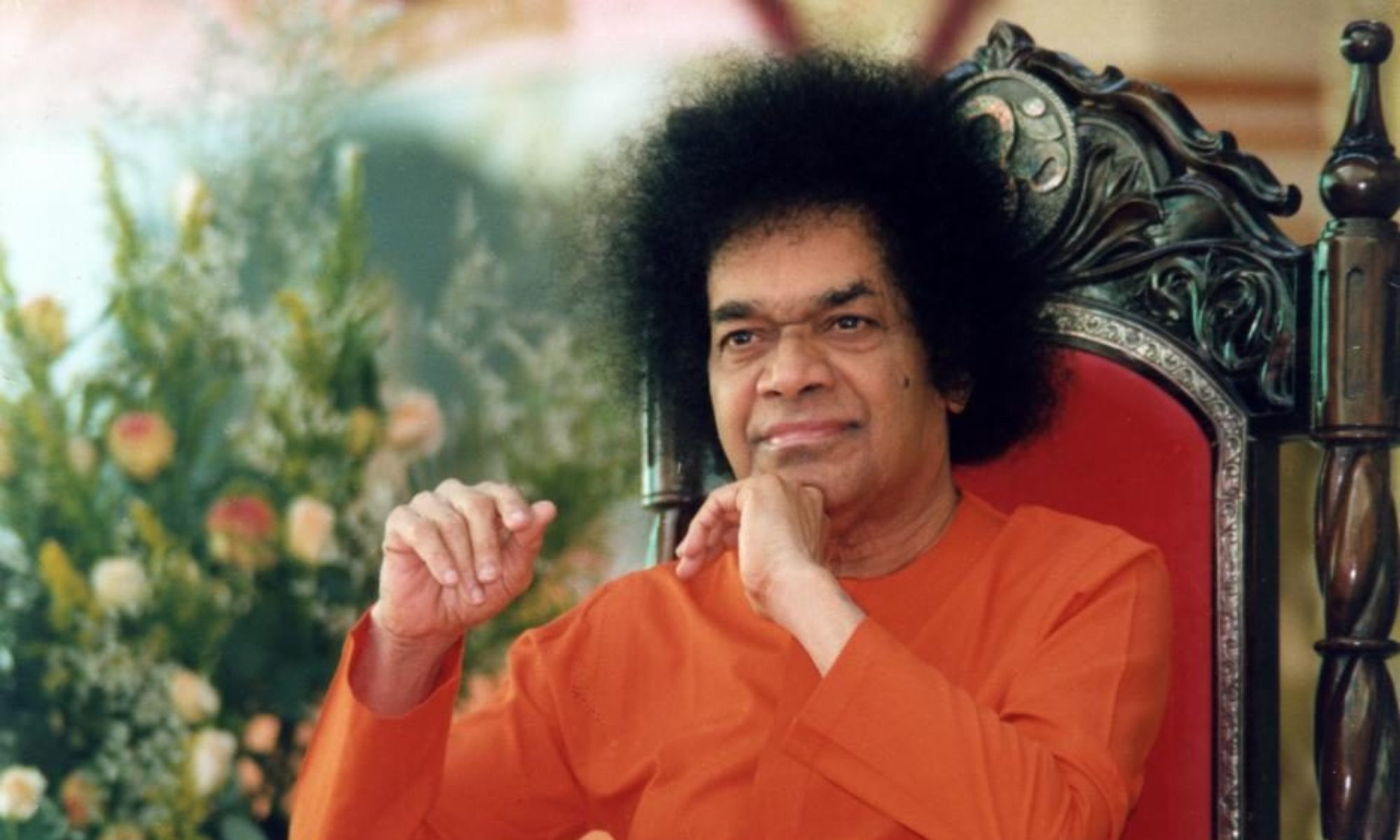In this edition
- Upcoming events
- Geetha Vahini
- Sri Sathya Sai Baba on Himself
- Rama accepts whoever surrenders
- Devotional activities in Chicago and suburbs
Upcoming Events
- Shri Sathya Sai Aradhana Mahotsvam
- Saturday, April 6, 2019: Special service project at FMSC, Schaumburg from 07:00 PM – 09:00 PM
- Wednesday, April 24, 2019: Special Devotional program at Sant Nirankari from 07:30 PM – 10.30 PM
- Saturday, April 27, 2019: Mini Retreat with Prof. Anil Kumar (Swami’s divine discourse translator) at Sant Nirankari from 10:00 AM – 04:30 PM
- Sunday, April 14, 2019
- Ugadi, Vishu and Rama Navami celebrations
- Special Devotional Program by YAs
- Time: 09:30 AM – 01:00 PM
- Venue: River Forest Community Center
- Sunday, April 21, 2019Easter Celebrations
- Special Devotional Program
- Time: 09:30 AM – 01:00 PM
- Venue: River Forest Community Center
Geetha Vahini
When man has a right for engaging in karma, he has a right also for the fruit; no one can deny this or refuse his right. But the doer can, out of his own free will and determination, refuse to be affected by the result, whether favorable or unfavorable. The Geetha shows the way: “Do –and deny the consequence.” The desire for the result of your action is a sign of Rajo Guna. The giving up of action since you cannot benefit by the fruit is a sign of Thamo Guna (dullness, ignorance). To engage oneself in karma, to know that the result will follow, and yet, not to be attached to it or getting concerned with it—that is the sign of Sathwa Guna (pure).
The Karma Yogi who has learnt this secret of “Karma combined with Phalathyaga” should have Samabuddhi (equanimity), more than Sangabuddhi (mind attached to the world). For, the Sangabuddhi draws him into attachments and entanglements. “This karma is mine, its results are due to my endeavors. I am the person entitled to it,” such are the thoughts which bind the doer. Krishna advises that one should rise above this Sangabuddhi. He declared that Samathwam (unruffled equanimity) is the genuine Yoga. (Samathwam yogamuchyathe).
In the second chapter, Krishna has made clear, in a general way, four principal points: the Saranagathi principle, the Sankhya teaching (path of knowledge), the Yoga attitude and the Sthithaprajna (steady wisdom individual) nature. We have noted the first three already. Now about the fourth:
Krishna taught Arjuna the nature and characteristics of the Sthithaprajna (steady wisdom individual) when Arjuna questioned him. Arjuna prayed “O Kesava!” and when that appellation was used, Krishna smiled. For He knew then that Arjuna had understood His splendor. Do you ask how? Well, what does Kesava mean? It means, “He who is Brahma, Vishnu, Shiva, the Thrimurthi (Trinity).” Through Krishna’s Grace, Arjuna had reached that stage of realization.
When Arjuna prayed that Kesava must tell him the true characteristics of a Sthithaprajna, He replied, “Partha! He will be free from all desire. He will be stable in the knowledge and awareness of the Atma only.”
Now, there are two processes in this: To give up all the promptings of desire in the mind is the negative process; to implant joy, ever-present joy therein, is the positive aspect. The negative process is to remove all the seedlings of wrong and evil from the mind. The positive process is to grow, in the field cleansed thus, the crop of attachment to God! The cultivation of the crop you need is positive, the plucking of the weeds is the negative stage. The pleasures the senses draw from the objective world are weeds, the crop is the attachment to God. The mind is a bundle of wishes. Unless these wishes are removed by their roots, there is no hope of destroying the mind, which is a great obstacle in the path of spiritual progress. When the yarn that comprises the cloth is taken out, one by one, what remains of the cloth? Nothing. The mind is made of the warp and woof of wishes. And when mind vanishes, the Sthithaprajna is made.
So, the first thing to be conquered is Kama, the demon of desire. For this it is unnecessary to wage a huge war. It is also unnecessary to use pleasing words to persuade the desire to disappear. Desires will not disappear for fear of the one or for favor of the other. Desires are objective, they belong to the category of the “seen.” With the conviction that, “I am the seer only, not the seen,” the Sthithaprajna releases himself from attachment. By this means he conquers desire. You must watch the working of the mind, from outside it. You should not get involved in it. That is the meaning of this discipline
-Excerpts from Geetha Vahini
Sri Sathya Sai Baba on Himself
An Avatar is an Incarnation of God. In a broad sense, everything in the Universe is a manifestation of God. Yet, the term Avatar is reserved for those Incarnations wherein the Lord deliberately assumes a specific form for a specific purpose. Swami says,
The word Avatar means descent. It is not coming down from the peak of a mountain or the top story of a tall building. It is a descent from the state of the Atma to the level of the body. No blemish attaches to the Divine as a result of the descent. There is no diminution in Divine power either. Let us say there is a child playing on the ground. If the mother feels it is beneath her dignity to bend, and tells the child to leap into her arms, the child cannot do so. The mother does not ask the child to do such an impossible thing. Instead, full of love, the mother stoops and lovingly picks up the child. Likewise, the Lord incarnates assuming a human form to bless and rescue those who cannot rise to the level of the Divine. Incarnation is an act of benediction.
What about the name ‘Sai Baba’ of the present Poorna Avatar? Swami has this to say:
The name ‘Sai Baba’ means ‘Divine Mother and Divine Father’. Like a mother, I will be tender and soft and give you happiness, and like a father, I will punish you when needed. Through these methods I shall take you to a high level.
Why does God incarnate? Swami goes deeper into the subject. He says,
To elevate man to the level of Supreme Consciousness, God has to incarnate as man. God has to speak to man in his own style and language. He has to teach mankind the methods that it can adopt and practice. Birds and beasts need no Divine incarnation to guide them for they have no inclination to stray away from their respective duties. Man alone forgets the goal of life. The essential quality of an Avatar is to teach you to make good and proper use of your thought, word and deed. Depending on the conditions and the environment in the country, the Avatar will teach and show the right use of the Divine faculties gifted to man.
In earlier incarnations, the Lord physically annihilated the evil. What about this time? Swami has the answer:
In this Kali Age, the wicked have to be reformed and reconstructed through Love and Compassion. That is why this Avatar has come unarmed. The Avatar has come with the Message of Love. My objective is to establish unity in mankind, to reveal the aspect of the Divinity latent in man, and that God must be the only goal in life. It is also My duty to make you realize the kind of relationship that should exist between fellow human beings. There is considerable change in human outlook that I have to bring about. No one can stop Me or deter Me from fulfilling these tasks for which I have come, namely the establishment of the one unchanging Truth. In this task, you have a part to play.
Playing a role in Swami’s global Mission calls for a proper attitude and frame of mind. Many people are carried away by Baba’s miracles, but that is not correct, as Swami warns. He says:
You must take a path by which you can see deep in My heart, and experience the various Divine aspects of Mine. You must understand the all-knowing power in Me. Do not be led away by people who always talk of having got a locket or a watch or a ring from Me. These things have no deep meaning. Divine Love is associated with Immortality. It is to teach mankind the truth about this Divine Love that Love itself incarnates on earth in human form. When Narayana (Supreme God) takes the form of a man and wants to help humanity, He will act like a man. Just because God comes in human form, it is no excuse for man to be indifferent. He must realize that all the Poorna Avatars are incarnations of the same Formless, Eternal, Supreme Consciousness and the Cosmic, Omnipresent, Omnipotent, and Omniscient God.
When the Avatar appears in human form, we find that He exhibits human consciousness along with Divine Consciousness. Ordinary people cannot grasp the Divine Consciousness of the Avatar.
-Baba’s discourses on Himself
Rama accepts whoever surrenders
God is so merciful that He will come ten steps towards you, if you but take one step towards Him. Vibhishana, the brother of Ravana, inquired from Hanuman whether Rama will accept his homage and take him under His protecting shade. Vibhishana said: “I am the brother of His worst enemy, whom He has vowed to destroy; I am a member of the demonic race; I am unacquainted with the Vedas or Sastras”. Then Hanuman replied: “O you fool! Do you think He cares for ritual correctitude, or family status or scholarship? If so, how could He accept me, a monkey?” Vibhishana was assured of grace. When he went to Rama later, Rama asked the elder monkeys around Him whether He could accept Vibhishana into the fold. Of course, He did not need any counsel from anyone. He was never influenced by others. But, still, just to bring them into the picture, He made a pretense of not having made up His mind yet. When Sugriva said “no”, Rama reminded him that he too had come to Him, first, giving up his elder brother! When Lakshmana said that he deserved to be thrown back into Lanka, Rama said, and “Yes! I am resolved to crown him as the emperor of Lanka”. Whoever surrenders, Rama accepts without reservations. When someone suggested that Ravana may fall at the feet of the Lord and earn pardon, Rama replied, “In that case, I will hold both hands of Bharata and beg him to make Vibhishana Emperor of Ayodhya, our ancestral domain; we both, Bharata and I, will spend our time happily in the forests”.
Devotional Activities in Chicago and Suburbs
- Every Monday
- Bhajans in Aurora Shirdi Mandir from 07:00 PM – 08:00 PM
- Every Wednesday
- Bhajans in Hoffman Estates from 07:30 PM – 08:30 PM
- Every Friday
- Bhajans in Oak Brook from 08:00 PM – 09:00 PM
- First Saturday of the month
- Bhajans in Glenview from 04:30 PM – 05:30 PM
- Saturday March 9, 2019
- Paduka Puja in Bolingbrook from 10:00 AM – 12:00 PM
- Saturday March 23, 2019
- Bhajans in Burr Ridge from 06:30PM – 07:30 PM

